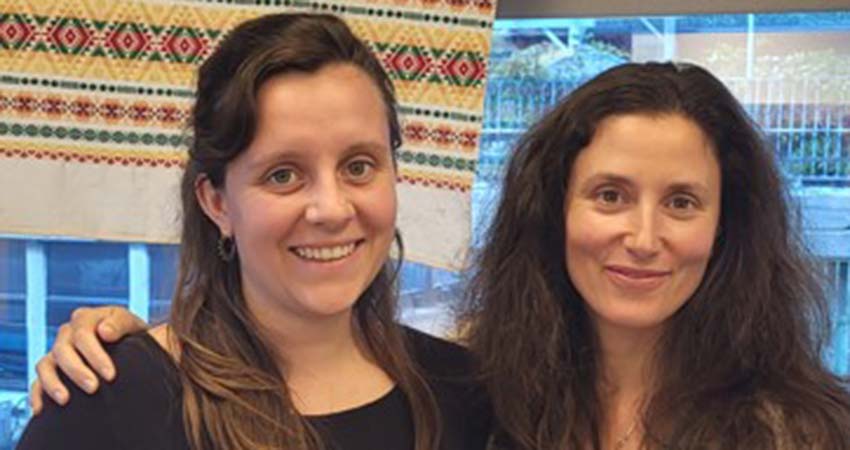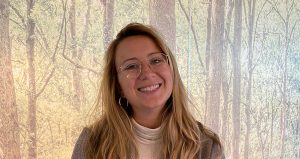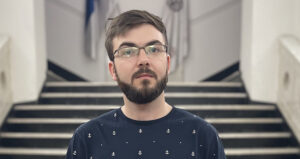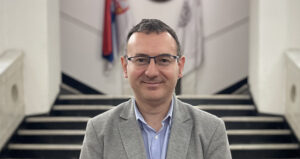Aviva and Raphaela: “EJWP participants are very engaged”

-
 Editorial Team
Editorial Team
Share article:
Aviva Zimbris, monitoring, evaluation, accountability, learning officer and Raphaela Bigler, reporting coordinator, with EcoPeace Middle East in Israel participated in the EJWP Training Week in Tel Aviv 11-15 June. They shared their combined views on the collaboration opportunity and about the water sector with Water News Europe.
What are the objectives and actions of EcoPeace?
Raphaela: “EcoPeace Middle East is a unique organization that brings together Jordanian, Palestinian and Israeli Environmentalists. Our primary objective is the promotion of cooperative efforts to protect our shared environmental heritage. In so doing, we seek to advance both sustainable regional development and the creation of necessary conditions for lasting peace in our region. EcoPeace has offices in Amman, Ramallah, and Tel-Aviv.” Aviva: “I work from Tel Aviv with all three offices on developing metrics to measure the impact of our programmes and efforts at EcoPeace. I conduct participant surveys and evaluate the feedback to improve our training. Receiving high rates on our participants’ willingness to engage cross-border gives me a lot of hope to continue my work. I also hope to continue co-creating an integrated evaluation and monitoring mechanism. This allows us to not only keep improving our programme work, but also to continuously gain the support of our donors.”
Why did you become interested in participating in the EJWP Training Week sessions?
“EcoPeace and EJWP are collaborating as part of the training week and we took the opportunity to join some of the training sessions. The collaborative project with EJWP participants and EcoPeace was one of the week’s points of interest. The EJWP participants presented valuable data points and research on the Jordan River and its rehabilitation. We are looking forward to the final report, and are positive it will offer valuable insights which may be adapted in EcoPeace materials for training on the Jordan River rehabilitation. During their stay in the region the EJWP participants also went on a tour to explore issues in the field. There they met Palestinian and Israeli alumni from EcoPeace’s Climate Diplomacy Young Professional programme and gained a personal perspective about the situation on the ground. These encounters may aid to expand their networks and hopefully lead to further collaborations.”
What were takeaways from sessions with EJWP?
Aviva: “The negotiation training helped me in before running towards a solution, to take into consideration that the other needs to be able to create more options.” Raphaela: “The consulting training made me realize that consulting skills are useful within our own organization to form partnerships with other departments and improve the way we work together on a daily basis.”
What were your impressions of the diversity and expertise in the EJWP sessions?
“External trainings like the EJWP offer a great opportunity to meet and engage with like-minded professionals from different places around the world and to exchange knowledge and expertise. The EJWP participants were very engaged. The group had a great dynamic and I could tell they had formed strong connections over the course of the long-term programme. Especially during the negotiation session, we realized how much cultural understanding plays into the way we engage with our counterparts. Attitudes and different ways of communication have a significant impact on the way we were able to move each other on the issues of our example cases. This insight is of course also relevant for the challenges and opportunities at hand in the region I live in.”
How do you see the importance of training cooperation between European and Middle East organizations?
“There are a lot of opportunities and learning about cultural sensitivities among participants from different backgrounds. Hearing from the EJWP participants on how they experienced their trip to the region opens an avenue for shared understanding and to form connections that might at some point manifest in future collaborations. For such collaborations to be fruitful, I think it is crucial for people to meet face-to-face and learn from each other and the complex situation on the ground, with all its opportunities and challenges. Otherwise, we might propose clean solutions to one another, but they end up not being practical.”
What is a water or environmental topic that you see as important?
“Civic engagement and awareness around climate change implications and sustainability efforts is much lower in the Middle East than in Europe. There is still a great potential and a big need for people to learn and teach more about environmental protection. For example, the way communities treat their wastewater affects the ecosystem and other communities even across borders. Oftentimes the lack of awareness also manifests itself in a lack of infrastructure or a lack of legislation to protect nature. These topics need to be simultaneously addressed more thoroughly by the governmental bodies responsible. “
What would you change in water policy or practice?
“I believe that there needs to be a greater awareness that the health of our environment is interlinked with the health of the people living in it. The environment knows no borders and it is therefore crucial to work together to solve environmental challenges. Because if we serve our shared environment, we ultimately serve our own communities.”
What did you study?
Aviva: “International Conflict Studies and Sustainability.” Raphaela: “International affairs & Governance.”
Where and in which position would you like to be working in five years?
“In the Middle East, we are already seeing the impact of climate change as temperatures have risen significantly over the past decade. I wish that we understand the urgency of these changes in our region and that we can be a leading example of strengthening climate resilience. I wish to continue my professional efforts in the fields of sustainable development and environmental protection.”

















